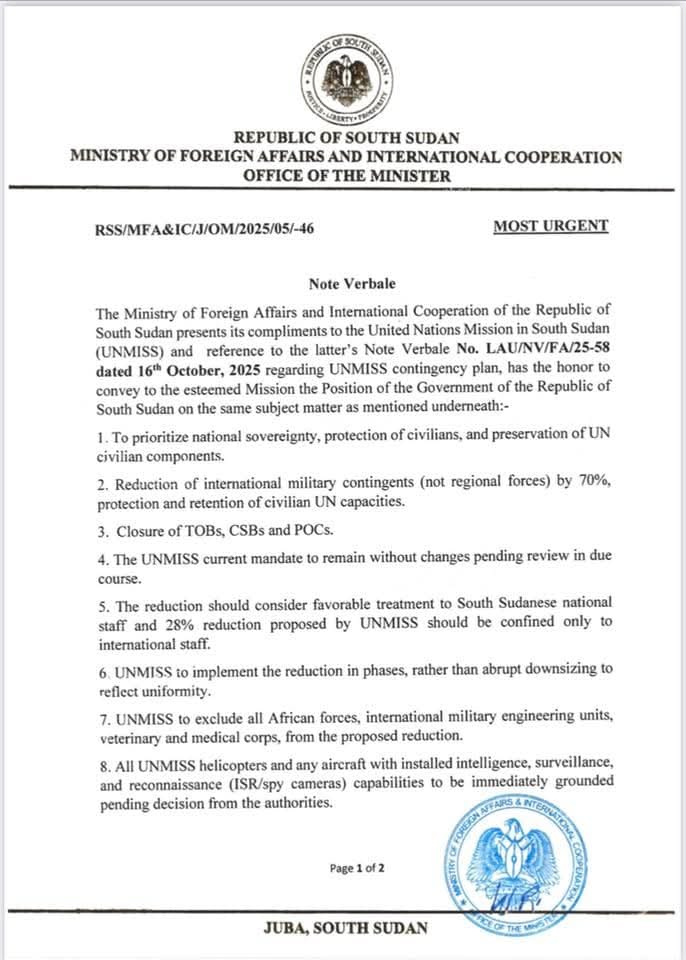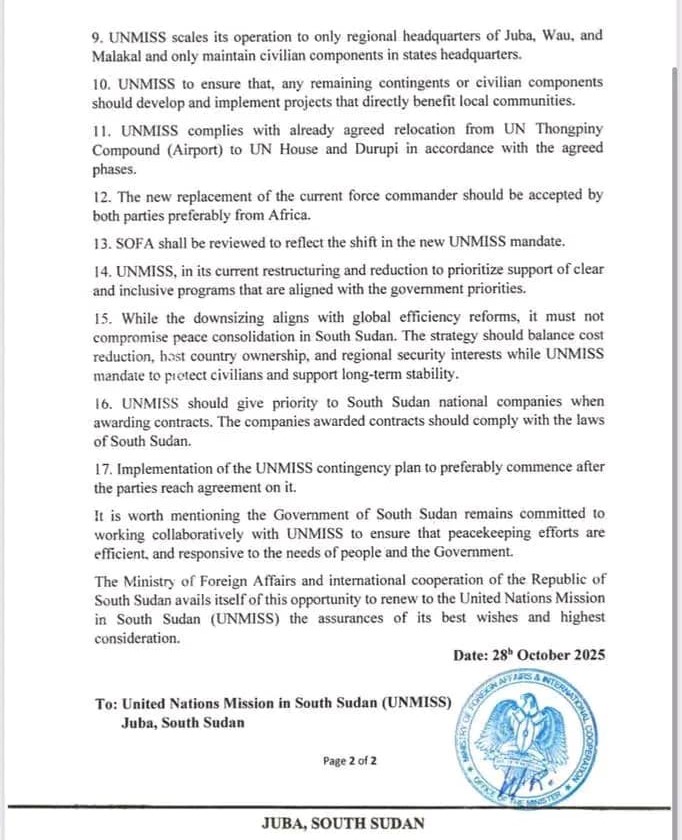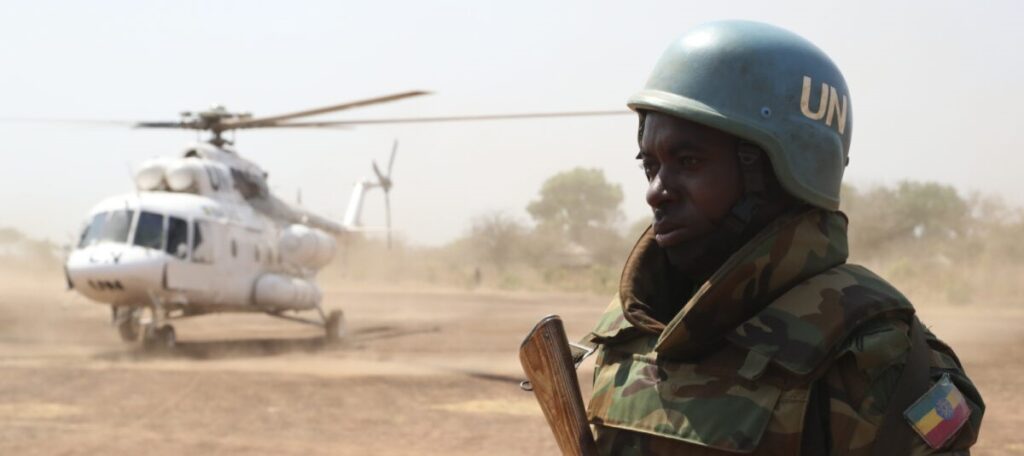South Sudan’s government has formally demanded that the United Nations Mission in South Sudan (UNMISS) reduce its international military contingents by 70%, ground all aircraft with intelligence-gathering capabilities, and close several military bases and civilian protection sites, according to a diplomatic note obtained by Radio Tamazuj.
The directive, outlined in a note verbale from South Sudan’s Ministry of Foreign Affairs dated 28th October 2025, represents the most significant challenge to date for one of the UN’s largest peacekeeping operations. If implemented, the demands would fundamentally reshape the mission’s ability to operate across the world’s youngest nation.
The note orders the immediate grounding of “all UNMISS helicopters and any aircraft with installed intelligence, surveillance, and reconnaissance (ISR/spy cameras) capabilities pending decision from the authorities.” Such restrictions would sharply curtail the mission’s ability to monitor conflict zones and protect civilians.
It also calls for the “closure of TOBs, CSBs, and POCs” — referring to Temporary Operating Bases, Company Operating Bases, and Protection of Civilians sites. The POC sites have long sheltered hundreds of thousands of people displaced by South Sudan’s civil war and waves of communal violence.
According to the government, the 70% reduction should apply only to “international military contingents (not regional forces),” with “African forces, international military engineering units, veterinary and medical corps” excluded from the proposed cuts. The provision indicates Juba’s preference for maintaining regional African troops while drastically reducing Western military presence.
The note further instructs that any staff reductions “consider favorable treatment to South Sudanese national staff” and that the “28% reduction proposed by UNMISS should be confined only to international staff.”
While insisting on maintaining UNMISS’s existing mandate “without changes pending review in due course,” the government said the downsizing should be carried out “in phases, rather than abrupt downsizing to reflect uniformity.” It stressed that the move is aimed at safeguarding “national sovereignty, protection of civilians, and preservation of UN civilian components,” suggesting it wants to retain UN humanitarian and development activities while reducing military operations.
The United Nations Security Council in May extended the UNMISS mandate for another year, maintaining a ceiling of 17,000 troops and 2,101 police personnel. The new demands would, if implemented, significantly reduce the mission’s reach and operational capacity.
Under the proposal, UNMISS would be restricted to operating from three regional headquarters — Juba, Wau, and Malakal — with only civilian staff retained in other state capitals. The plan would effectively remove the mission’s military footprint from much of the country.
The government reiterated its demand for UNMISS to complete its relocation from the UN Thongpiny Compound near Juba Airport to UN House and Durupi in accordance with previously agreed phases.
The government also seeks greater control over the mission’s leadership, insisting that any replacement for the current Force Commander be mutually agreed upon and preferably from an African nation. The directive further calls for a review of the Status of Forces Agreement (SOFA), the legal framework governing the UN’s operations in South Sudan.
Additionally, the government wants UNMISS to prioritize South Sudanese companies in its contracting processes and says any contingency measures should only proceed after mutual agreement with authorities.
While the government acknowledged that downsizing aligns with broader UN efficiency reforms, it warned that the drawdown should not undermine South Sudan’s fragile peace process. It called for a balance between cost-cutting and maintaining the mission’s core mandate to protect civilians.
The government’s position was discussed on Tuesday in a meeting co-chaired by Foreign Minister Monday Semaya K. Kumba and Anita Kiki Gbeho, the Acting Special Representative of the Secretary-General.
When contacted by Radio Tamazuj for comment, UNMISS spokesperson Priyanka Chowdhury said the mission is “engaging constructively with our government partners regarding the contingency measures UNMISS is undertaking due to the severe financial constraints faced by the United Nations globally.”
“We value the government’s concerns and sincerely appreciate their cooperation,” she said. “As a mission, we continue to prioritize our mandated tasks as we navigate this challenging time.”
Edmund Yakani, a leading civil society activist, said the proposed reduction has drawn mixed reactions among the public.
“Ordinary citizens who see the role of UNMISS are surprised by the reduction,” Yakani said, adding that while some officials view it as an opportunity to pressure UNMISS to leave, others may be seeking to avoid international scrutiny “on matters of political accountability and respect for human rights.”
“The government’s communication shows a feeling that the recent UNMISS downsizing decision offers an opportunity to accelerate the mission’s departure,” he said. “It’s true that the global financial squeeze could make UNMISS reduce its presence faster than expected.”
The move comes as South Sudan continues to implement a fragile 2018 peace deal that ended a brutal civil war which killed hundreds of thousands of people. UNMISS, established in 2011, has played a key role in protecting civilians and supporting the peace process.






